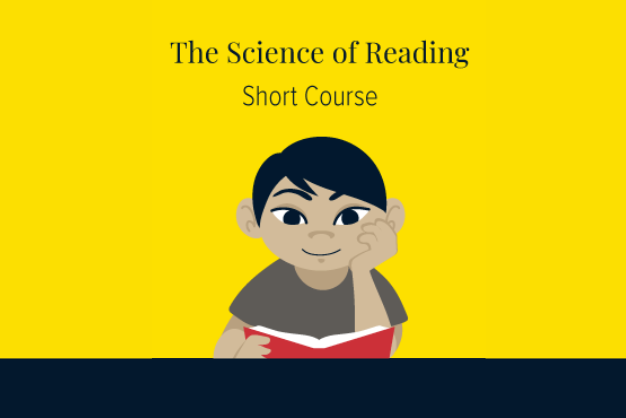Science of Reading
In partnership with national reading experts who share our commitment to advancing evidence-based reading practices in schools, Hill has developed a robust portfolio of self-paced online courses to support any educator’s science of reading journey.
Flexible, digestible, full of instructional resources, and grounded in research and practice, these courses can be used both to introduce educators to the science of reading and writing and to serve as a systematic review of the latest research and most effective strategies for those who are familiar with the concepts but need a quick refresher or more resources and support applying their knowledge in practice.
For those seeking a more comprehensive, sequenced learning experience designed for a cohort of educators, Hill offers facilitated sessions for reflection, processing, and shared learning.

Featured Course
Science of Reading Short Course
One-of-a-kind overview of the science behind effective reading instruction!
Since 2021, over 7,500 individuals worldwide enrolled in the self-paced online course, and the course continues to offer an efficient and affordable introduction to the science of reading for a variety of educators. The course includes six self-paced
modules, as well as a short introduction and wrap-up.
In-Person Workshops
Excellent decoders are not always excellent comprehenders. Many times, our students seem to have all of the necessary skills they need to be good readers (things like phonemic awareness, phonics, fluency, vocabulary, and comprehension strategies, to name a few), but somehow, they still struggle with putting all of these things together in order to comprehend texts. In this workshop, we will dig a bit deeper than the familiar skills listed above to explore essential thinking skills, called executive functions, that support successful reading comprehension.
Learn MoreThis is a hands-on interactive workshop wherein participants will be actively involved in learning instructional strategies for helping elementary students find success with writing. Participants will begin with learning ways to help students develop sentence-level writing skills using a multisensory approach. Following sentence-level work, participants will be taught the basics of Paragraphology® from the brainstorming process, through understanding color-coding, to understanding how to write basic and expanded paragraphs. Every participant will make a manipulative that acts as a graphic organizer that can easily be made with students.
Learn MoreThis is a hands-on interactive workshop for middle and high school teachers wherein participants will be actively involved in every step of Paragraphology® from the brainstorming process, through understanding color-coding, to understanding how to unlock a writing prompt. Every participant will make a manipulative that acts as a graphic organizer; this can easily be made with students.
Learn MoreSelf-Paced and Custom Offerings
The Science of Reading Short Course offers a one-of-a-kind overview of the science behind effective reading instruction. Developed by a coalition of reading experts, the course gives educators critical information about what comprises the reading process by laying a solid conceptual and practical foundation for how to teach reading.
The 10–15-hour, self-paced course is an efficient introduction to the science of reading for a variety of educators – teachers, instructional coaches, school and district leaders, pre-service candidates, and pre-service faculty, whose training may not have adequately prepared them for evidence-based instruction in reading.
The course was developed in collaboration with advisors from Barksdale Reading Institute, Hill Learning Center, The Reading Teacher’s Top Ten Tools, Right to Read Project, and 95 Percent Group.
Facilitated cohort support is available. To learn more, contact scienceofreading@hillcenter.org.
Learn More (Link opens in a new tab)Hill Learning Center offers facilitation to help participants process, reflect on, synthesize, and apply the content in the Science of Reading Short Course. Contact us to learn about facilitation guides and synchronous, interactive webinars or in-person facilitation by our reading experts.
Learn MoreThis 10-hour asynchronous course will explore the principles and content of structured literacy. The principles guide how elements are taught in a method that is instructionally sound. Structured literacy aligns with the Science of Reading and includes the principles of effective reading instruction. The course will define each principle and content area offering some instructional examples for each tier of instruction.
Recommended Pre-requisite: Science of Reading Short Course or another introduction to the Science of Reading.
Learn MoreThis 10-hour online course will engage participants in a deep dive into content that will enable them to support readers in the challenge of breaking the alphabetic code. First, the course focuses on Phonological Awareness (PHA) and the recommended instructional skill sequence for learners. The content will explain why PHA is a prerequisite for phonics instruction and plays a key role in reading instruction for students with persistent reading challenges.
Note: This offering is available to North Carolina educators.
Inquire Now (Link opens in a new tab)Facilitated Support for Schools, Districts, and Cohorts
Inquire to learn more about our live, virtual sessions for school-, district-, or network-based cohorts to support custom, facilitated support in the science of reading. Due to the school-based, tailored nature of this learning experience, please contact scienceofreading@hillcenter.org to learn more.
On the Blog
Structured Literacy and the Science of Reading
Exploring the connection
Reading is a complex neurological process, and structured literacy instruction uses explicit, evidence-based methods that are appropriate for all students but essential for students with learning differences, especially those with dyslexia. This systematic approach is based on the science of reading, which is a body of scientifically validated and replicable studies of both reading instruction and human processing. In this blog, we break down structured literacy, the science of reading, and how they align to support all readers.

